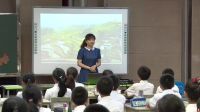視頻簡(jiǎn)介:

視頻標(biāo)簽:At the farm
所屬欄目:小學(xué)英語(yǔ)優(yōu)質(zhì)課視頻
視頻課題:Unit 4At the farm人教(PEP)西南大學(xué)附屬小學(xué)
教學(xué)設(shè)計(jì)、課堂實(shí)錄及教案:Unit 4At the farm人教(PEP)西南大學(xué)附屬小學(xué)
教學(xué)目標(biāo)評(píng)論
語(yǔ)言技能與運(yùn)用
在參觀農(nóng)場(chǎng)的語(yǔ)境中理解并綜合運(yùn)用句型Are these…? Yes, they are./No, they aren’t. What are these/those? They’re …;正確使用核心詞匯、句型和同學(xué)交流蔬菜的話題。
情感態(tài)度
(1)以小組合作學(xué)習(xí)的方式培養(yǎng)學(xué)生的合作精神,鼓勵(lì)學(xué)生積極地和同學(xué)交流、分享。
(2)感受不同農(nóng)場(chǎng)的不同特點(diǎn)。
學(xué)習(xí)策略
(1)小組分工合作,各展所長(zhǎng),共同完成學(xué)習(xí)任務(wù)。
(2)以語(yǔ)境、語(yǔ)篇帶動(dòng)核心句型的學(xué)習(xí),在聽(tīng)讀語(yǔ)篇的基礎(chǔ)上,通過(guò)問(wèn)答、完成表格等方式理解學(xué)習(xí)并運(yùn)用核心句型。
2學(xué)情分析評(píng)論
這個(gè)階段兒童思維發(fā)展開(kāi)始從具體形象思維向抽象邏輯思維過(guò)渡,但是他們的抽象邏輯思維在很大程度上仍然是直接與感性經(jīng)驗(yàn)相聯(lián)系,仍有很大的不自覺(jué)性和具體形象性。所以語(yǔ)法的講解在這個(gè)階段會(huì)比較困難,抽象的概念很難被他們接受,與其去講賓格主格和感嘆句的結(jié)構(gòu),還不如通過(guò)詞句的反復(fù)訓(xùn)練和感知來(lái)習(xí)得語(yǔ)法知識(shí)。從情感反映的內(nèi)容來(lái)看,他們出現(xiàn)了與學(xué)習(xí)興趣、學(xué)習(xí)成績(jī)相聯(lián)系的理智感,控制情感能力逐步增強(qiáng)。在小組比賽時(shí),他們一方面會(huì)顯得異常興奮,另一方面比較調(diào)皮的孩子會(huì)為了小組的利益對(duì)自己的不良行為保持克制。所以在教學(xué)中,我以小組活動(dòng)為載體,充分調(diào)動(dòng)學(xué)生的主觀能動(dòng)性,讓孩子們?cè)诤献髦袑W(xué)習(xí)。與本課相關(guān)的已知語(yǔ)言點(diǎn)有部分水果的單詞和句型“What's this? It's a..."本課則在此基礎(chǔ)上引出其復(fù)數(shù)形式。
3重點(diǎn)難點(diǎn)評(píng)論
1.在參觀農(nóng)場(chǎng)的語(yǔ)境中理解并綜合運(yùn)用句型Are these…? Yes, they are./No, they aren’t. What are these/those? They’re …并正確使用核心詞匯、句型和同學(xué)交流蔬菜的話題。
2.名詞復(fù)數(shù)形式的特殊疑問(wèn)句和一般疑問(wèn)句。
3. 學(xué)生能夠感受并理解名單詞、復(fù)數(shù)的意義以及相應(yīng)句型的變化,并能在情景中正確運(yùn)用和表達(dá)。
4教學(xué)過(guò)程
4.1第一學(xué)時(shí)
4.1.1教學(xué)活動(dòng)
活動(dòng)1【導(dǎo)入】Pre-task preparation評(píng)論
1.Warming-up song: Old MacDonald had a farm.
Enjoy and sing the song by singing and watching the video.
2.Know about the farm.
Enjoy the pictures of the farm to create an active atmosphere and to elicit the topic.
活動(dòng)2【講授】While-task procedure評(píng)論
1.T:Sarah and her friends are visiting Mac’s farm,let's go to take a look..(Watch the video of “Main scene” to feel the farm.)
2.T:What vegetables are Mike and Sarah talking about?(Watch the video of “Let’s talk” and try to remember the vegetables,and learn the two new words.)
3.T:Are the carrots big or small? What colour are the tomatoes?
Are they good?(Watch the video again, try to answer the two questions,to help students learn the meaning &pronunciation of the target language in real situation.)
4.Group work1.
Try to imitate the recording, the whole group imitate together.(Help students understand the general idea of the passage with the visual and audio aids.)
5.Group work2.
Read the talk in your own group, then have a competition in groups.(Consolidate the language and to prepare for the output.)
活動(dòng)3【活動(dòng)】Post-task Activities評(píng)論
1.Watch the video about my QQ farm.
1-1Watch and try to repeat the fruits.
1-2Ask and answer :What are these? They are....
2.Group work3.
Ask and answer one by one with the pictures your group have got. “What are these? They are...”
3.Guessing game with the pictures.
Guess with the sentence “Are these...?
4.Group work 4: Let’s play.
Use the pictures they have got,ask and answer with the sentences below.
”What are these? Are they...? Yes,they are./No, they aren't.”
5.Group work 5: Make a new dialogue and role play.(Help the students use the target language to introduce their own farms.)
Design their own farms with the pictures they’ve got.
活動(dòng)4【測(cè)試】Assignments評(píng)論
Talk show in groups.
Provide students with more chances to consolidate and use the language in real situation.
視頻來(lái)源:優(yōu)質(zhì)課網(wǎng) www.jixiangsibao.com
| -----更多視頻請(qǐng)?jiān)诒卷?yè)面頂部搜索欄輸入“At the farm”其中的單個(gè)詞或詞組,搜索以字?jǐn)?shù)為3-6之間的關(guān)鍵詞為宜,切記!注意不要輸入“科目或年級(jí)等文字”。本視頻標(biāo)題為“Unit 4At the farm人教(PEP)西南大學(xué)附屬小學(xué)”,所屬分類為“小學(xué)英語(yǔ)優(yōu)質(zhì)課視頻”,如果喜歡或者認(rèn)為本視頻“Unit 4At the farm人教(PEP)西南大學(xué)附屬小學(xué)”很給力,您可以一鍵點(diǎn)擊視頻下方的百度分享按鈕,以分享給更多的人觀看。優(yōu)質(zhì)課網(wǎng) 的成長(zhǎng)和發(fā)展,離不開(kāi)您的支持,感謝您的關(guān)注和支持!有問(wèn)題請(qǐng)【點(diǎn)此聯(lián)系客服QQ:983228566】 ----- |
